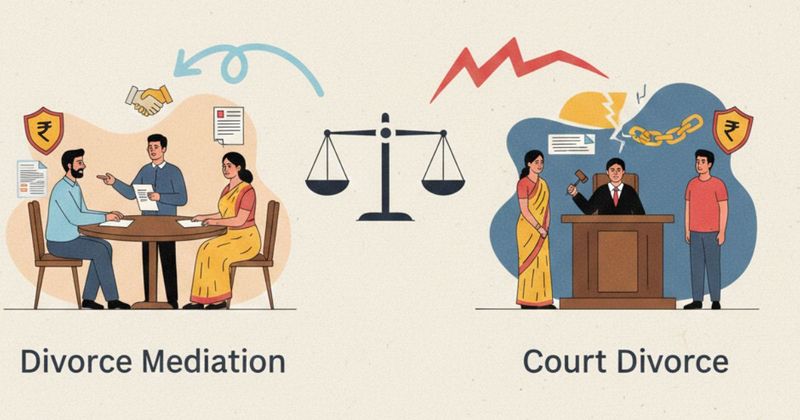Divorce mediation is gaining recognition as an alternative dispute resolution process in India, offering couples a more amicable and less adversarial approach to resolving their differences. Mediation involves a neutral third party, the mediator, who helps facilitate constructive communication and negotiation between spouses.
One of the primary advantages of divorce mediation is its cost-effectiveness. Mediation is generally less expensive than traditional litigation, as it involves fewer court appearances and legal fees. It allows couples to save time and money while working towards a mutually agreeable resolution.
Confidentiality is another significant benefit of divorce mediation. Unlike courtroom proceedings, mediation discussions remain private and confidential. This allows couples to have open and honest conversations without the fear of their personal matters being disclosed in a public forum. Confidentiality encourages productive dialogue and a greater willingness to explore creative solutions.
Preserving relationships is often a priority for couples going through divorce, particularly when children are involved. Mediation focuses on fostering cooperation and effective communication, allowing couples to maintain a respectful relationship even after the divorce is finalized. This can have a positive impact on co-parenting and minimize the potential negative effects of divorce on children.
Mediation provides couples with greater control over the outcome of their divorce. Instead of having a judge make decisions on their behalf, couples actively participate in shaping their settlement agreement. This sense of control and ownership promotes a greater sense of satisfaction and reduces the likelihood of future disputes.
In India, trained mediators play a crucial role in facilitating successful mediation. They are skilled professionals who help couples navigate the process, ensure fairness, and guide them towards mutually beneficial solutions. Mediators are neutral and impartial, focusing on the best interests of both parties and facilitating constructive dialogue.
While mediation can be highly effective in many divorce cases, it may not be suitable for all situations. Instances of abuse, power imbalances, or extreme hostility may require other legal remedies. It is important for couples to assess their unique circumstances and consult with professionals to determine if mediation is a viable option for them.
Divorce mediation offers a more flexible, cost-effective, and cooperative approach to resolving marital disputes in India. By considering mediation, couples can potentially achieve a more amicable and mutually beneficial resolution, reduce conflict, and pave the way for a smoother transition into their post-divorce lives.
In conclusion, understanding divorce laws, recognizing the effects on children, considering financial implications, seeking emotional support, and exploring alternatives like mediation are vital aspects of divorce in India. By addressing these topics, individuals can navigate the complexities of divorce with greater knowledge and make informed decisions that lead to a more positive and empowering post-divorce journey.




